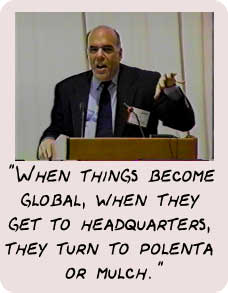|
|
Katalina Groh, Larry Prusak: Some of the world's leading thinkers |
| Storytelling: Organizational Perspective: Larry Prusak |
 |
Local
knowledge
Then we get to another important
issue. This is one that you donít hear about as much. But I think itís
key. Itís called localism. Knowledge is sticky, local and contextual. It
stays where it is, especially innovative knowledge. Innovations in general
come from the bottom up. Itís generally the interface between the worker
and the work. Iíd say thatís true in schools, in consulting firms, from
the highest to the lowest, thereís a type of parallel to evolution, where
you get hybrids and genetic offshoots that just happen somewhat randomly
in nature, and if it increases adaptation, it propagates. The same thing
happens in organizations.
|
| They were people who
do work and they say, ďOh, if we turn this three times, instead of four,
we get a greater yield.Ē No one knows it. Itís not documented. Itís nobodyís
job to take care of that. And there it is. Nobodyís job. Nobody cares.
Everyone cares but nobody cares. Whose job it is to harvest innovations
in an organization? Nobody. Itís fascinating, isnít it. It should be everyoneís
job. Peter Drucker thinks it should be. But when something is everyoneís
job, it ends up being nobodyís job.
So one of the things that weíve learnt is that we have to keep an eye on the local. When things become global, when they get to headquarters, they turn into polenta or mulch. I mean, no one gets excited reading memos from the top. But they do get excited hearing about innovations, peer to peer. Someone comes to you, someone you trust, someone you have a peer sense with, and says, ďHey, weíve done this and this occurs.Ē Then you think, ďGreat!Ē Jack Grayson is going to talk about education. My wife was a teacher for many, many years. And she would love hearing other teachers saying, ďIíve tried this and this works.Ē Now you have to institutionalize that eventually, I completely agree with you. But on the other hand, thatís where the innovation comes from. She would get memos. I mean, just last month, I should have brought it for you. There was an article in the New York Times about someone who received a large grant to do research on New York city schools. Right? no surprise there. The person got close to a million dollars. He has an institute. He never set foot in a classroom. Never, never, never. He didnít walk into a classroom in New York city. I have relatives who teach in that system. Iím a product of that system. Believe me, if you donít go into the classroom, I donít care how much data you manipulate, youíre not going to really get it. Youíre not going to produce anything of value. The same thing happened in re-engineering. It happens in knowledge management too. The abstraction of work to the point where it becomes schematic, rather than a deep rich understanding of whatís to be done is an evil. Itís an evil perpetrated by vendors, by consultants, and journalists, I may add. And itís taught in the business schools. But itís all wrong. But thatís why thereís a contempt for business schoolsí ideas by people who actually work. There shouldnít be, thereís a great value in analytics, a great value. But itís distrusted, because people donít have a sense of the culture, of the politics, or of what really goes on in organizations. Now knowledge is local, but thereís a balance. How do you achieve local knowledge, and still institutionalize it, to use the language of the previous speaker, which is absolutely correct. Itís an art. Itís a balance. But very often in organizations, it veers towards the global, towards headquarters, towards the Chief Knowledge Officer, rather than: where are the innovations? How do we understand them without killing them? How do we get others to understand them? How do we propagate this? And believe me, itís not putting a document in a repository. Save your money! Give it to the United Way! Itís not a way to transfer knowledge or do anything with knowledge that Iím talking about. So localism is pretty important. |
| Books and videos on storytelling *** In Good Company : How Social Capital Makes Organizations Work by Don Cohen, Laurence Prusak (February 2001) Harvard Business School Press *** The Social Life of Information, by John Seely Brown, Paul Duguid (February 2000) Harvard Business School Press *** The Springboard : How Storytelling Ignites Action in Knowledge-Era Organizations by Stephen Denning (October 2000) Butterworth-Heinemann *** The Art of Possibility, a video with Ben and Ros Zander : Groh Publications (February 2001) |
| The views expressed on this website are those of the authors, and not necessarily those of any person or organization |
| Site optimized in 800x600: webmaster CR WEB CONSULTING |
|
|
|
|